外研版(2019)必修 第三册Unit 1 Knowing me, knowing you Understanding ideas 课件(共47张PPT)
文档属性
| 名称 | 外研版(2019)必修 第三册Unit 1 Knowing me, knowing you Understanding ideas 课件(共47张PPT) | 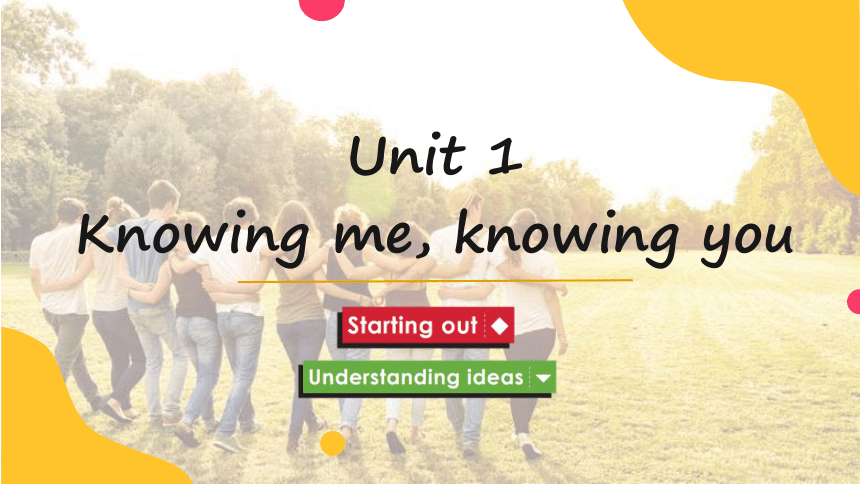 | |
| 格式 | pptx | ||
| 文件大小 | 54.3MB | ||
| 资源类型 | 教案 | ||
| 版本资源 | 外研版(2019) | ||
| 科目 | 英语 | ||
| 更新时间 | 2024-12-19 13:24:50 | ||
图片预览

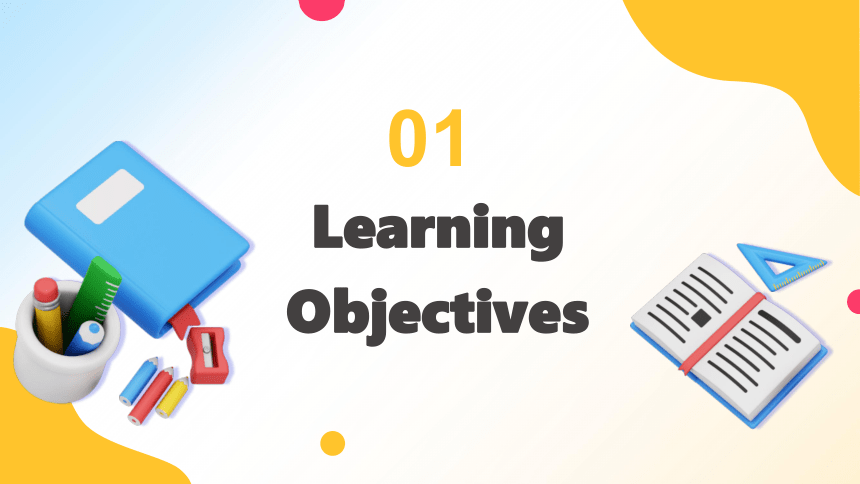

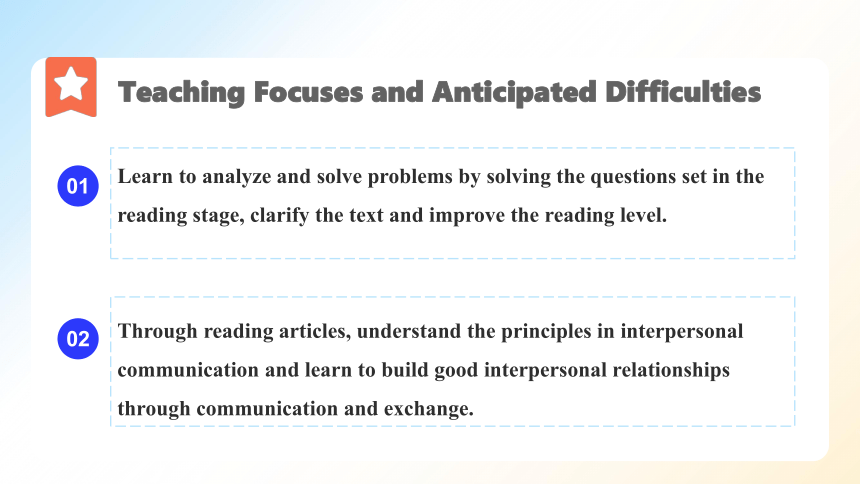
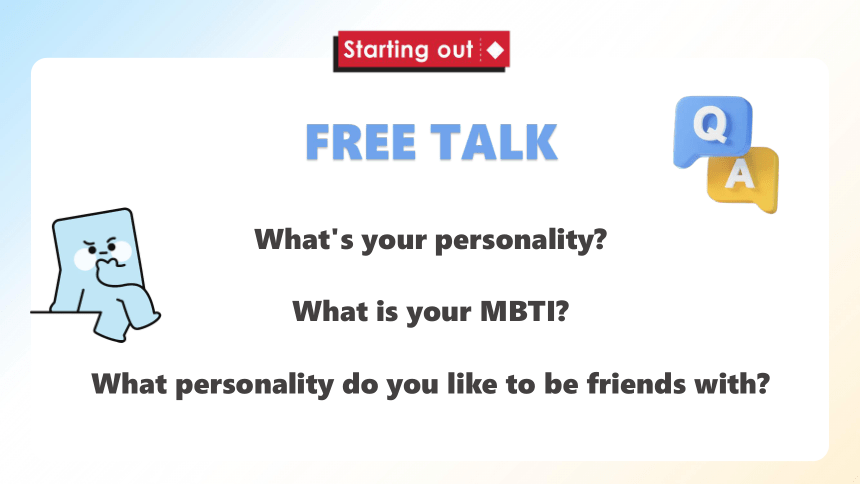
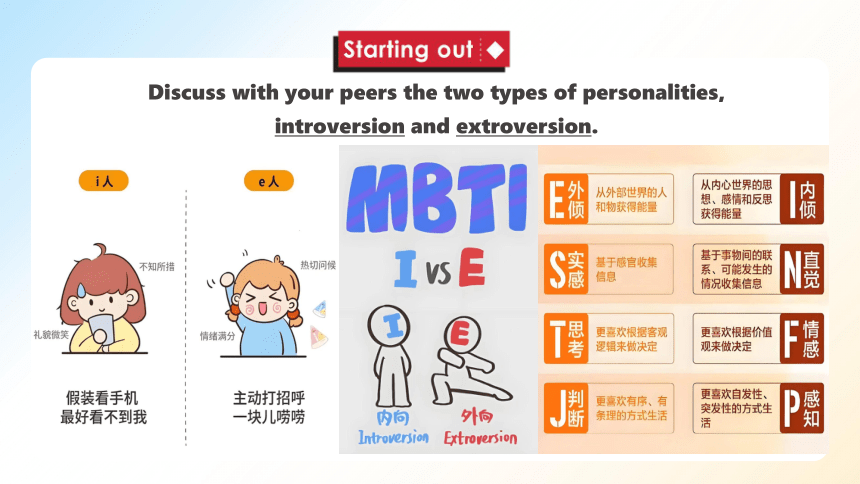

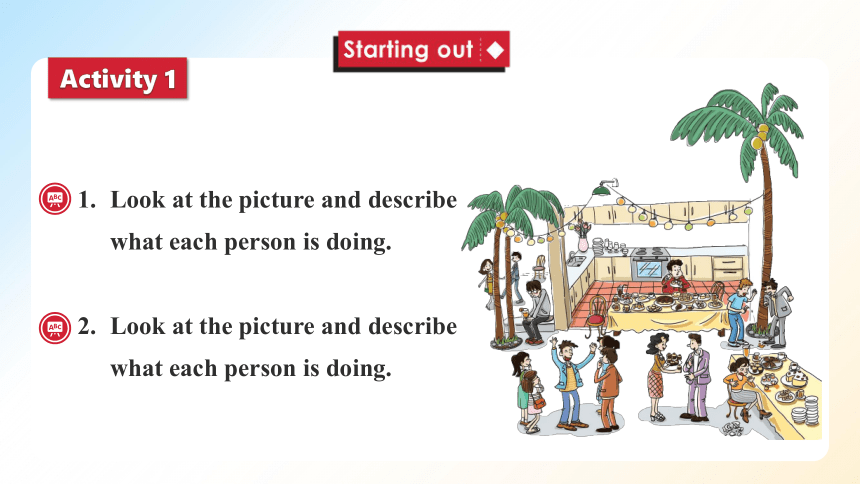
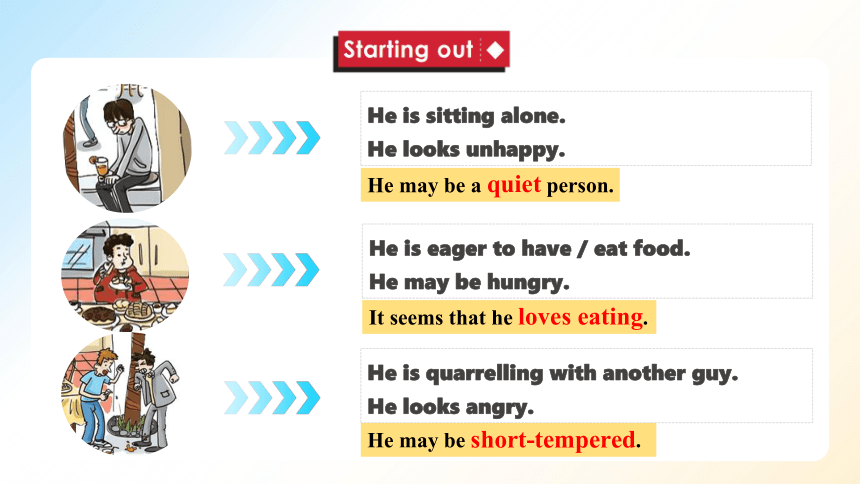
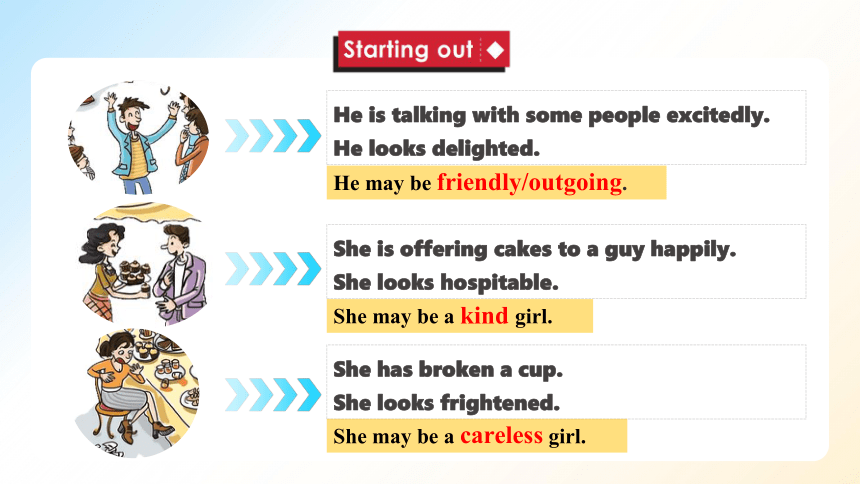
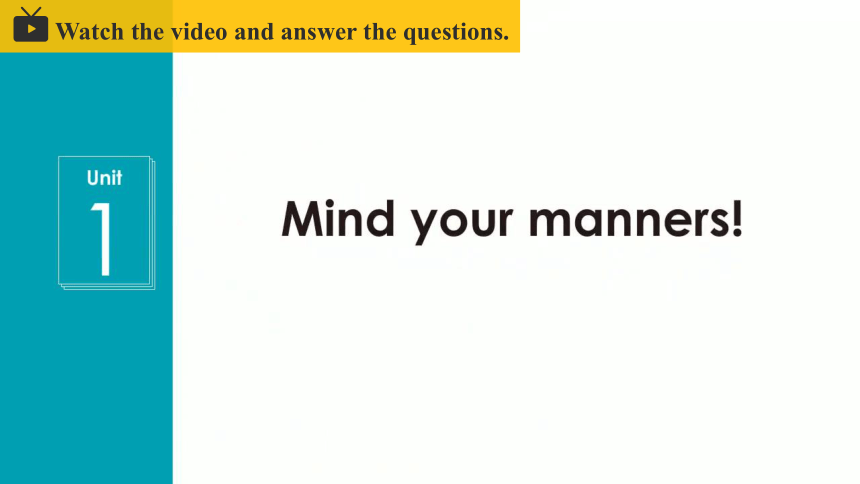
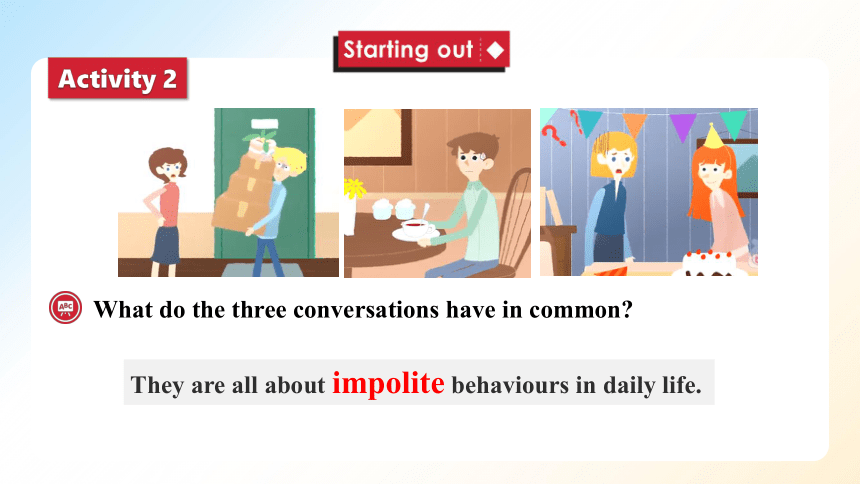
文档简介
(共47张PPT)
Unit 1
Knowing me, knowing you
Learning Objectives
01
Learning Objectives
01
Grasp the key words and the phrases: fault, resolve, embarrassed, signal, concern, help out, let down, let off steam, take a breath, pull one's weight, etc.
03
Through reading articles, understand the principles in interpersonal communication and learn to build good interpersonal relationship through communication and communication.
02
Learn to use speed reading and intensive reading to deepen their understanding of texts and acquire different reading skills and methods.
Learn to analyze and solve problems by solving the questions set in the reading stage, clarify the text and improve the reading level.
Through reading articles, understand the principles in interpersonal communication and learn to build good interpersonal relationships through communication and exchange.
01
02
Teaching Focuses and Anticipated Difficulties
FREE TALK
What's your personality
What is your MBTI
What personality do you like to be friends with
Discuss with your peers the two types of personalities,
introversion and extroversion.
Watch the video and know more about introversion and extroversion.
Activity 1
Look at the picture and describe what each person is doing.
Look at the picture and describe what each person is doing.
He is sitting alone.
He looks unhappy.
He is eager to have / eat food.
He may be hungry.
He is quarrelling with another guy.
He looks angry.
He may be a quiet person.
It seems that he loves eating.
He may be short-tempered.
He is talking with some people excitedly.
He looks delighted.
She is offering cakes to a guy happily.
She looks hospitable.
She has broken a cup.
She looks frightened.
He may be friendly/outgoing.
She may be a kind girl.
She may be a careless girl.
Watch the video and answer the questions.
Activity 2
What do the three conversations have in common
They are all about impolite behaviours in daily life.
Activity 2
What would you do in similar situation
In situation 1: I would…
thank the boy for his help without complaining
listen to the friend patiently without interrupting
In situation 3: l would…
In situation 2: I would…
thank the girl sincerely without asking how much it is
Activity 1
Look at the problems you may face at school.
Discuss which you think is the most difficult to overcome and why.
bad performance in a subject
pressure to look good
conflict with classmates
difficulties fitting in with others
...
Now think about who you turn to for help when you face a problem.
Activity 1
parents
fridends
to yourself
teachers
online forums
agony aunt
Activity 2
Predict the main idea of the text according to the picture and the title. Read the letter and find out what kind of problems Ben had and who he turns to for help.
Vocabulary
02
traffic signals 交通信号灯
adanger/warning signal 一个危险/警告信号
signal to sb. 向某人发信号,示意某人
signal sb. to do sth. 示意某人做某事
signal (to sb.) for sth. 示意要某物
练习:他示意服务员结账。
He ________ to the waiter for the bill.
signalled
1. signal
be one's fault 是某人的过错
at fault 有过错,有责任的
for all one's faults 尽管(某人)有各种缺点
find fault with... 对……挑剔,对……不满
练习:尽管他有许多缺点,他还是一位好父亲。
_______________, For all his faults, he is a good father.
For all his faults
2. fault
辨析fault & mistake
fault: 多指性格上的弱点、行为上的过失,强调应为过失负责任。
mistake: 意为“错误,误会,误解”,多指因缺乏正确理解而造成判断和看法的错误。
show concern about/for... 担心/关心……
be concerned about/for 关心/担心……
be concerned with... 牵涉到,与……有关
as/so far as...be concerned 就……而言
concern oneself with/about... 对……感兴趣
aconcerned look 担忧的表情
练习:我们的老师表达了他对我们的关心。
_______________________________________
Our teacher showed his concern for us.
3. concern
4. embarrassed
embarrass
embarrassing
embarrassment
to one's embarrassment
练习:
He was very ______________ (embarrass) to hear people speak so highly of him.
embarrassed
vt. 使窘迫,使尴尬
adj. 使人难堪 (尴害羞)的
n. 窘迫难堪;使人为难的处境
使某人感到尴尬的是
5. ashamed
shameful
shameless
shame
to one's shame
It's a shame that...
What a shame!
练习:
I'm ____________ to say that I lied to her.
adj. 可耻的,丢脸的
adj. 无耻的,没廉耻的
n. 羞愧,羞耻
使某人感到羞愧的是
真遗憾……
真遗憾!/真可惜!
ashamed
6. concentrate
concentration
concentrate on
concentrate one's mind/attention/energy on…
练习:
___________ on food while eating.
Concentrate
n. 专心,专注
集中注意力于……
集中某人的注意力/精力于……
7. resolve
resolution
a resolution to do sth.
resolve (not) to do sth.
resolve on (doing) sth.
resolve differences
resolve an issue/a conflict/a crisis
练习:Always bear in mind that your own ___________ (resolve) to succeed is more important than anything else.
resolution
n.(问题、分歧等的)解决,消除;决心,决定
做某事的决心/决定
决定(不) 做某事
决定做某事
消除分歧
解决问题/冲突/危机
8. turn to
turn up 到达,露面 turn upon time 准时到达
turn down 拒绝 turn down one's invitation 拒绝某人的邀请
turn around 转身,翻转 turn the chair around 把椅子转过来
turn over 使翻转 turn the meat over把肉翻个面
turn out 结果是;出席,在场 ;生产
练习:He promised that he would come, but he hasn't __________ yet.
turned up
9. in a mess
messy
mess
make a mess of...
mess up
练习:
My dad gets cross with me if I leave the kitchen _____________(弄得一团糟).
in a mess
adj. 肮脏的凌乱的;混乱的,难以处理的
n. 困境,混乱;杂乱,不整洁 vt. 使不整洁,弄脏
把......搞糟
把......弄糟胡乱地做
Activity 2
Read the letter and find out what kind of problems Ben had and who he turns to for help.
Ben believed one of his teammates let down the whole team and told it to his best friend. But then his friend told everyone else what Ben had said.
Now Ben is at a loss for what to do, and he turns to Agony Aunt for help.
Activity 3
Choose the best summary of the letters.
Ben said something bad about his best friend, and Agony Aunt told him to apologise to his friend.
Ben was angry that his team was let down by some members, and Agony Aunt told him to take it easy.
Ben didn't play well in the match, and Agony Aunt advised him to apologise to his teammate.
Ben was in an awkward situation, and Agony Aunt gave him suggestions as to how to deal with his problems.
Read the passage carefully and choose the best answer.
1. Why did Ben's team lose the match
A. The members played badly.
B. Ben didn't play well in the match.
C. The point guard was hurt in the match.
D. The point guard performed badly.
Read the passage carefully and choose the best answer.
2. What put Ben in an awkward situation
A. His team's losing the match.
B. His best friend's telling what he said to others.
C. His not concentrating on studying.
D. His letting off steam.
Read the passage carefully and choose the best answer.
3. What does Agony Aunt think of Ben's behaviour
A. Favorable. B. Opposed.
C. Understandable. D. Admirable.
Read the passage carefully and choose the best answer.
4. What does Agony Aunt advise Ben to do first
A. To apologise to the point guard.
B. To communicate with his best friend.
C. To think about his own behaviour.
D. To ask other teammates to resolve the conflict
Activity 4
Complete the sentences with the expressions from the passage.
the team were
let down
to let off steam
went and told
everyone else
what I'd said
disappointed
mad / angry
awkward / embarrassed / shamed
apologize to your teammate
communicating with each other clearly
repeating what you said
making the situation worse
say too much
think first, speak later
resolving conflicts
① apologize
② communicate
③ think twice
Showing understanding
Giving suggestions
encourage Ben
Activity 4
...but then my friend went and told everyone else what I'd said.
Here’s what you need to do.
what 引导名词性从句
当what用作连接代词引导名词性从句时,可引导主语从句、宾语从句、表语从句和同位语从句。
what在引导名词性从句时有两个重要的特点:一是它在相应的名词性从句中一定有含义,常表示"……的东西/样子/事情等";二是它在相应的名词性从句中一定作成分,常作主语、宾语、表语或定语等。
what 引导名词性从句
What you say is quite true.
你说的完全是事实。(What引导主语从句)
Nobody knows what will happen next.
没有人知道接下来将会发生什么事。( what引导宾语从句)
Fame and personal gain is what they’re after.
他们追求的是名利。(what引导表语从句)
I have no idea what we should do next.
我不知道下一步我们该干什么。(what引导同位语从句)
It is understandable in that situation, but we should always think before we speak.
before 引导的时间状语从句
这个句子是由but连接的并列复合句。第二个分句是个主从复合句,before引导时间状语从句。
before引导时间状语从句时可以根据语境译作"在……之前""过了……(时间)才……"和"还没来得及……就……"。
before 引导的时间状语从句
It was +时间段+before... 过了……才……(一般过去时)
It was not long before... 不久就……(一般过去时)
It won’t be long before... 不久就会……(一般现在时)
It will/may be +时间段+before... 要过/或许要过……才…(一般现在时)
They walked about 30 miles before they sawavillage.
他们走了大约30 英里才看到一个村庄。
Before I knew it an hour had passed and it was time to move on to lunch.
我还没意识到,一个小时就已经过去了,该吃午饭了。
Think & Share
1 What do you think of Agony Aunt’s advice
objective 中肯的 specific 具体的
feasible 可行的 sincere 真诚的
practical 实用的 useful 有用的
effective 有效的 innovative 独创的
Think & Share
2 What other advice would you give to Ben
Don't criticise, condemn(指责), or complain about people.
Appreciate people.
Avoid arguing, and understand that you really aren't always right.
Save your anger.
Be genuinely interested in others.
Be a good listener.
Make others feel important.
If you're wrong, admit it.
Think & Share
3 What is your understanding of the saying “Loose lips sink ships”
loose lips sink ships 是美国的俚语,它源自于二战期间,美国政府为了运输军火,征集了大量的商船。这时候一位船员在出海之际,忍不住在码头附近的一家咖啡馆,和女友进行电话告别。在电话里,船员将船队的所有出海信息,全部告诉了女友,让女友放心。
但是,一位伪装成商人的德国间谍正好坐在咖啡馆里,他默不作声地将消息传递给了德国的情报机构。茫茫大海中,当美国船队遇到德国潜艇,结局显而易见。于是,美国战争广告委员会创造了一个短语,“多嘴必沉船” (Loose lips sink ships),还专门把它做成了海报,提醒广大民众少说话,言多必失。
Think & Share
3 Do you know any similar sayings in Chinese
“病从口入,祸从口出。”——晋·傅玄《口铭》
“言多必有数短之处。”——《鬼谷子·本经符》
(直言贾祸)“子好直言,必及于难。”——《左传·成公十五年》
(祸发齿牙)“祸发齿牙,言生枝叶,率是道也。”——唐·元稹《戒励风俗德音》
Summary
03
教学实施方案
Homework
04
Homework
1. make specific suggestions for Ben's problems;
2. summarise what we have learnt in this lesson;
3. prepare for the next lesson
See you
next class!
Unit 1
Knowing me, knowing you
Learning Objectives
01
Learning Objectives
01
Grasp the key words and the phrases: fault, resolve, embarrassed, signal, concern, help out, let down, let off steam, take a breath, pull one's weight, etc.
03
Through reading articles, understand the principles in interpersonal communication and learn to build good interpersonal relationship through communication and communication.
02
Learn to use speed reading and intensive reading to deepen their understanding of texts and acquire different reading skills and methods.
Learn to analyze and solve problems by solving the questions set in the reading stage, clarify the text and improve the reading level.
Through reading articles, understand the principles in interpersonal communication and learn to build good interpersonal relationships through communication and exchange.
01
02
Teaching Focuses and Anticipated Difficulties
FREE TALK
What's your personality
What is your MBTI
What personality do you like to be friends with
Discuss with your peers the two types of personalities,
introversion and extroversion.
Watch the video and know more about introversion and extroversion.
Activity 1
Look at the picture and describe what each person is doing.
Look at the picture and describe what each person is doing.
He is sitting alone.
He looks unhappy.
He is eager to have / eat food.
He may be hungry.
He is quarrelling with another guy.
He looks angry.
He may be a quiet person.
It seems that he loves eating.
He may be short-tempered.
He is talking with some people excitedly.
He looks delighted.
She is offering cakes to a guy happily.
She looks hospitable.
She has broken a cup.
She looks frightened.
He may be friendly/outgoing.
She may be a kind girl.
She may be a careless girl.
Watch the video and answer the questions.
Activity 2
What do the three conversations have in common
They are all about impolite behaviours in daily life.
Activity 2
What would you do in similar situation
In situation 1: I would…
thank the boy for his help without complaining
listen to the friend patiently without interrupting
In situation 3: l would…
In situation 2: I would…
thank the girl sincerely without asking how much it is
Activity 1
Look at the problems you may face at school.
Discuss which you think is the most difficult to overcome and why.
bad performance in a subject
pressure to look good
conflict with classmates
difficulties fitting in with others
...
Now think about who you turn to for help when you face a problem.
Activity 1
parents
fridends
to yourself
teachers
online forums
agony aunt
Activity 2
Predict the main idea of the text according to the picture and the title. Read the letter and find out what kind of problems Ben had and who he turns to for help.
Vocabulary
02
traffic signals 交通信号灯
adanger/warning signal 一个危险/警告信号
signal to sb. 向某人发信号,示意某人
signal sb. to do sth. 示意某人做某事
signal (to sb.) for sth. 示意要某物
练习:他示意服务员结账。
He ________ to the waiter for the bill.
signalled
1. signal
be one's fault 是某人的过错
at fault 有过错,有责任的
for all one's faults 尽管(某人)有各种缺点
find fault with... 对……挑剔,对……不满
练习:尽管他有许多缺点,他还是一位好父亲。
_______________, For all his faults, he is a good father.
For all his faults
2. fault
辨析fault & mistake
fault: 多指性格上的弱点、行为上的过失,强调应为过失负责任。
mistake: 意为“错误,误会,误解”,多指因缺乏正确理解而造成判断和看法的错误。
show concern about/for... 担心/关心……
be concerned about/for 关心/担心……
be concerned with... 牵涉到,与……有关
as/so far as...be concerned 就……而言
concern oneself with/about... 对……感兴趣
aconcerned look 担忧的表情
练习:我们的老师表达了他对我们的关心。
_______________________________________
Our teacher showed his concern for us.
3. concern
4. embarrassed
embarrass
embarrassing
embarrassment
to one's embarrassment
练习:
He was very ______________ (embarrass) to hear people speak so highly of him.
embarrassed
vt. 使窘迫,使尴尬
adj. 使人难堪 (尴害羞)的
n. 窘迫难堪;使人为难的处境
使某人感到尴尬的是
5. ashamed
shameful
shameless
shame
to one's shame
It's a shame that...
What a shame!
练习:
I'm ____________ to say that I lied to her.
adj. 可耻的,丢脸的
adj. 无耻的,没廉耻的
n. 羞愧,羞耻
使某人感到羞愧的是
真遗憾……
真遗憾!/真可惜!
ashamed
6. concentrate
concentration
concentrate on
concentrate one's mind/attention/energy on…
练习:
___________ on food while eating.
Concentrate
n. 专心,专注
集中注意力于……
集中某人的注意力/精力于……
7. resolve
resolution
a resolution to do sth.
resolve (not) to do sth.
resolve on (doing) sth.
resolve differences
resolve an issue/a conflict/a crisis
练习:Always bear in mind that your own ___________ (resolve) to succeed is more important than anything else.
resolution
n.(问题、分歧等的)解决,消除;决心,决定
做某事的决心/决定
决定(不) 做某事
决定做某事
消除分歧
解决问题/冲突/危机
8. turn to
turn up 到达,露面 turn upon time 准时到达
turn down 拒绝 turn down one's invitation 拒绝某人的邀请
turn around 转身,翻转 turn the chair around 把椅子转过来
turn over 使翻转 turn the meat over把肉翻个面
turn out 结果是;出席,在场 ;生产
练习:He promised that he would come, but he hasn't __________ yet.
turned up
9. in a mess
messy
mess
make a mess of...
mess up
练习:
My dad gets cross with me if I leave the kitchen _____________(弄得一团糟).
in a mess
adj. 肮脏的凌乱的;混乱的,难以处理的
n. 困境,混乱;杂乱,不整洁 vt. 使不整洁,弄脏
把......搞糟
把......弄糟胡乱地做
Activity 2
Read the letter and find out what kind of problems Ben had and who he turns to for help.
Ben believed one of his teammates let down the whole team and told it to his best friend. But then his friend told everyone else what Ben had said.
Now Ben is at a loss for what to do, and he turns to Agony Aunt for help.
Activity 3
Choose the best summary of the letters.
Ben said something bad about his best friend, and Agony Aunt told him to apologise to his friend.
Ben was angry that his team was let down by some members, and Agony Aunt told him to take it easy.
Ben didn't play well in the match, and Agony Aunt advised him to apologise to his teammate.
Ben was in an awkward situation, and Agony Aunt gave him suggestions as to how to deal with his problems.
Read the passage carefully and choose the best answer.
1. Why did Ben's team lose the match
A. The members played badly.
B. Ben didn't play well in the match.
C. The point guard was hurt in the match.
D. The point guard performed badly.
Read the passage carefully and choose the best answer.
2. What put Ben in an awkward situation
A. His team's losing the match.
B. His best friend's telling what he said to others.
C. His not concentrating on studying.
D. His letting off steam.
Read the passage carefully and choose the best answer.
3. What does Agony Aunt think of Ben's behaviour
A. Favorable. B. Opposed.
C. Understandable. D. Admirable.
Read the passage carefully and choose the best answer.
4. What does Agony Aunt advise Ben to do first
A. To apologise to the point guard.
B. To communicate with his best friend.
C. To think about his own behaviour.
D. To ask other teammates to resolve the conflict
Activity 4
Complete the sentences with the expressions from the passage.
the team were
let down
to let off steam
went and told
everyone else
what I'd said
disappointed
mad / angry
awkward / embarrassed / shamed
apologize to your teammate
communicating with each other clearly
repeating what you said
making the situation worse
say too much
think first, speak later
resolving conflicts
① apologize
② communicate
③ think twice
Showing understanding
Giving suggestions
encourage Ben
Activity 4
...but then my friend went and told everyone else what I'd said.
Here’s what you need to do.
what 引导名词性从句
当what用作连接代词引导名词性从句时,可引导主语从句、宾语从句、表语从句和同位语从句。
what在引导名词性从句时有两个重要的特点:一是它在相应的名词性从句中一定有含义,常表示"……的东西/样子/事情等";二是它在相应的名词性从句中一定作成分,常作主语、宾语、表语或定语等。
what 引导名词性从句
What you say is quite true.
你说的完全是事实。(What引导主语从句)
Nobody knows what will happen next.
没有人知道接下来将会发生什么事。( what引导宾语从句)
Fame and personal gain is what they’re after.
他们追求的是名利。(what引导表语从句)
I have no idea what we should do next.
我不知道下一步我们该干什么。(what引导同位语从句)
It is understandable in that situation, but we should always think before we speak.
before 引导的时间状语从句
这个句子是由but连接的并列复合句。第二个分句是个主从复合句,before引导时间状语从句。
before引导时间状语从句时可以根据语境译作"在……之前""过了……(时间)才……"和"还没来得及……就……"。
before 引导的时间状语从句
It was +时间段+before... 过了……才……(一般过去时)
It was not long before... 不久就……(一般过去时)
It won’t be long before... 不久就会……(一般现在时)
It will/may be +时间段+before... 要过/或许要过……才…(一般现在时)
They walked about 30 miles before they sawavillage.
他们走了大约30 英里才看到一个村庄。
Before I knew it an hour had passed and it was time to move on to lunch.
我还没意识到,一个小时就已经过去了,该吃午饭了。
Think & Share
1 What do you think of Agony Aunt’s advice
objective 中肯的 specific 具体的
feasible 可行的 sincere 真诚的
practical 实用的 useful 有用的
effective 有效的 innovative 独创的
Think & Share
2 What other advice would you give to Ben
Don't criticise, condemn(指责), or complain about people.
Appreciate people.
Avoid arguing, and understand that you really aren't always right.
Save your anger.
Be genuinely interested in others.
Be a good listener.
Make others feel important.
If you're wrong, admit it.
Think & Share
3 What is your understanding of the saying “Loose lips sink ships”
loose lips sink ships 是美国的俚语,它源自于二战期间,美国政府为了运输军火,征集了大量的商船。这时候一位船员在出海之际,忍不住在码头附近的一家咖啡馆,和女友进行电话告别。在电话里,船员将船队的所有出海信息,全部告诉了女友,让女友放心。
但是,一位伪装成商人的德国间谍正好坐在咖啡馆里,他默不作声地将消息传递给了德国的情报机构。茫茫大海中,当美国船队遇到德国潜艇,结局显而易见。于是,美国战争广告委员会创造了一个短语,“多嘴必沉船” (Loose lips sink ships),还专门把它做成了海报,提醒广大民众少说话,言多必失。
Think & Share
3 Do you know any similar sayings in Chinese
“病从口入,祸从口出。”——晋·傅玄《口铭》
“言多必有数短之处。”——《鬼谷子·本经符》
(直言贾祸)“子好直言,必及于难。”——《左传·成公十五年》
(祸发齿牙)“祸发齿牙,言生枝叶,率是道也。”——唐·元稹《戒励风俗德音》
Summary
03
教学实施方案
Homework
04
Homework
1. make specific suggestions for Ben's problems;
2. summarise what we have learnt in this lesson;
3. prepare for the next lesson
See you
next class!
